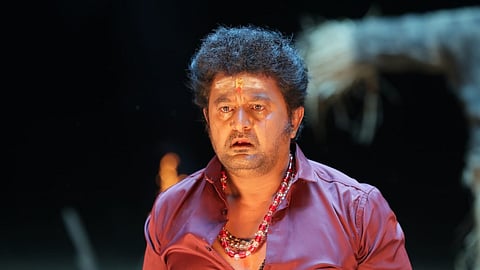Kona Movie Review: Komal Kumar anchors the film’s uneasy horror
Kona Movie Review(3 / 5)
A buffalo, a robot fortune teller, and a village full of secrets. Kona turns superstition into entertainment, mixing chills, humour, and chaos into a folk-horror carnival that keeps you engaged, even when it falters.
Director: Hari Krishna S
Cast: Komal Kumar, Tanisha Kuppanda, Rithvi Jagadish, Raghu Raamanakoppa, Jagappa, Ranjith, Namratha Gowda, Shishir Shastry, MK Mutt, and Vijay Chendoor
It starts with Jaggesh’s gravelly narration, leading us to a dusty, forgotten kingdom where rivers mark borders and whispers of death fill the air. Centuries ago, villagers near the border began dying under strange circumstances. To solve this, they created a life-sized doll, part deity and part demon, to watch over the village, along with a buffalo sacrifice meant to appease unseen forces. This ritual feels fitting for a place that hasn’t updated its calendar in two centuries.
In the present, Narayana (Komal Kumar), a drifter burdened by grief, travels with Jogi, a robot fortune teller that gives superstition a mechanical twist. Still mourning his late wife Lakshmi (Tanisha Kuppanda), Narayana’s world blurs the line between the mystical and the ordinary. They encounter a travelling drama troupe lead by Master (Raghu Ramankoppa), who are on the way to Koluru, a village where ancient fears collide with the modern world. Koluru is brimming with life, featuring stage plays, folk performances, and festival chaos. A cow dies under mysterious circumstances, a buffalo becomes an unlikely hero, and even animals seem aware of the villagers’ ignored secret. The rehearsals for the Rama and Sita play cleverly illustrate how devotion and performance merge into a single ritual cycle. Alongside the supernatural and social themes, Shruthi (Namratha Gowda), the village head's daughter, and Adarsh (Shishir Shastry) add a tender love story to the chaos. Jagappa, Raghu Ramankoppa, and the comic ensemble provide light-hearted humour. These characters navigate between skepticism and acceptance, painting a vivid picture of faith and folly.
Directed by Harikrishna S, the film focuses on the belief in animal sacrifice against the backdrop of a village fair. When the police step in to interrupt the annual Kona ritual, chaos unfolds. Harikrishna skillfully navigates the themes of blind faith and ritual sacrifice with a light touch. The story critiques superstition, using humour to make its point rather than resorting to preachiness. The tone often shifts, moving between ghostly tension and satire, sometimes disrupting its flow. Yet, Kona retains its heart, which lies in the absurdity of belief and the fear that fuels it.
The first half balances folklore with lightness, especially with moments like the robot predicting fates or villagers debating morality. The second half, however, loses some focus. Flashbacks drag on, subplots meander, and the film briefly overlooks the tension it had built. The climax, while thematically fitting, feels hurried.
Visually, Kona is immersive. The cinematography showcases dusty roads, dense forests, and festive chaos with detail and depth. The visual effects are minimal but maintain a subtle sense of horror. Shashank Seshagiri’s background score, particularly the Kona theme, keeps the tension high without overshadowing the narrative.
Komal Kumar delivers one of his most restrained performances, steering clear of slapstick to portray Narayana with weary grace, joined by a strong cast. Tanisha Kuppanda, who also doubles up as the producer, provides a grounded, serious portrayal, anchoring the emotional core. Raghu Ramankoppa, Namratha Gowda, Shishir, and Rithvi Jagadish offer solid support, enriching the world the film creates.
Kona shifts in tone and resolves its plot too neatly, but it boldly combines folklore with festival frenzy, superstition with satire, and fear with humour. It is visually rich, gently haunting, and often delightful. Kona is an effective horror-folk dramedy that questions blind faith while celebrating the spectacle of belief.

